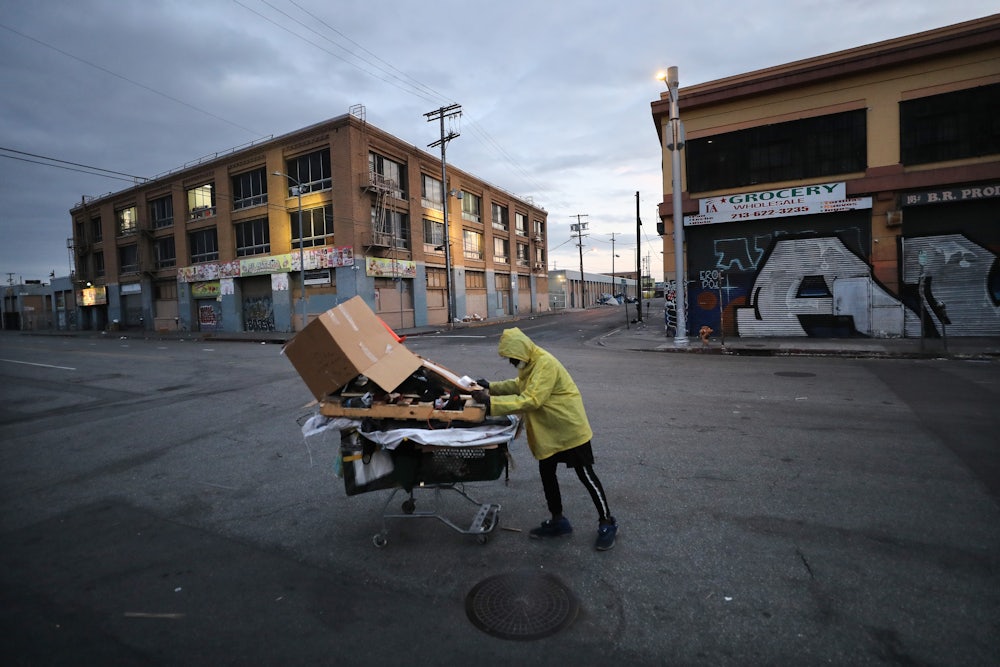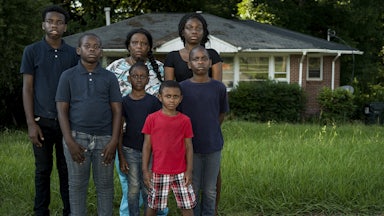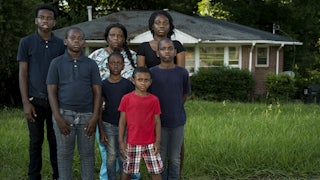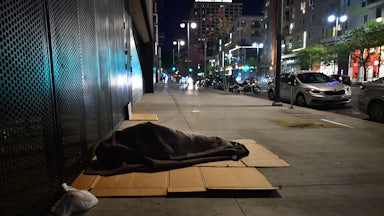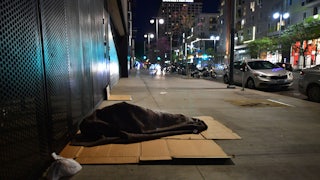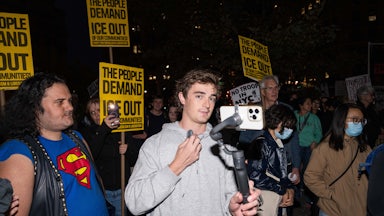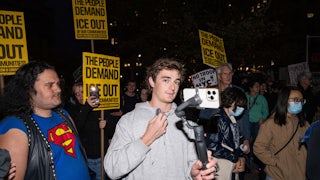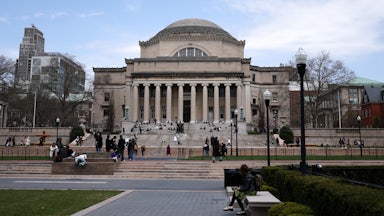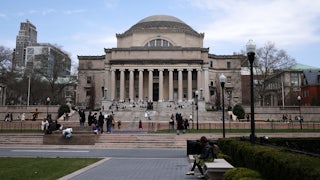Four years ago, the Ninth Circuit Court of Appeals issued a landmark decision on homelessness. The court ruled in Martin v. City of Boise that the Eighth Amendment forbids criminal charges against people for sleeping outdoors on public property if they have nowhere else to go. The decision limited local governments’ powers to arrest and remove homeless people from public spaces.
Now a broad coalition of cities, counties, and states across the Western United States is asking the Supreme Court to overturn that ruling. They claim that City of Grants Pass v. Johnson, the appeals court’s latest ruling, is making it even harder for them to address the homelessness crisis in states like California, Oregon, and Washington—or, perhaps more accurately, to pretend that they’re doing something about it.
While homelessness is found throughout the United States, is it particularly common in the Western states. Cities like San Francisco, Los Angeles, Portland, and Seattle are hot spots for the national crisis, in large part because they have temperate climates year-round and rarely experience extreme weather. According to The Atlantic, about one-third of the country’s homeless population, totaling more than 170,000 people, live in California. The state’s housing crisis has also made it particularly prone to homelessness among local residents.
The Ninth Circuit’s Martin ruling involved a group of homeless plaintiffs who challenged Boise ordinances that made it a misdemeanor to camp on sidewalks, parks, or other public places or to otherwise sleep anywhere without the owner’s permission. While Boise had three homeless shelters at the time of the ruling, all three had limited space and two were sex-segregated. Those who resided in them could only stay there for a limited period of time, after which they were barred from returning for 30 days. The plaintiffs argued that the state was essentially criminalizing them for sleeping in public when they had no alternative.
The Supreme Court has occasionally used the Eighth Amendment to strike down criminal laws that target characteristics instead of conduct. In the 1962 case Robinson v. California, the court ruled in favor of a defendant who had been convicted under a state law that made it illegal to be “addicted to the use of narcotics.” Justice Potter Stewart, writing for the majority, likened this to criminalizing a medical condition and wrote that it would be unconstitutional for someone to serve “one day in prison for the ‘crime’ of having a common cold.”
Six years later, in Powell v. Texas, the high court upheld a state law that criminalized public intoxication. In that case, a plurality of justices reasoned that while Robinson’s ruling was still valid, the Texas law did not run afoul of it because it criminalized an act, not a status. Justice Thurgood Marshall, writing for the plurality, concluded that the defendant was convicted “not for being a chronic alcoholic, but for being in public while drunk on a particular occasion.”
Drawing upon those precedents, the Martin panel concluded that sleeping in public while homeless could not be criminalized. “Any conduct at issue here is involuntary and inseparable from status—they are one and the same, given that human beings are biologically compelled to rest, whether by sitting, lying, or sleeping,” Judge Marsha Berzon concluded, paraphrasing from a judge’s dissent in a previous case. “As a result, just as the state may not criminalize the state of being ‘homeless in public places,’ the state may not criminalize conduct that is an unavoidable consequence of being homeless—namely sitting, lying, or sleeping on the streets.”
That ruling drew praise from advocates for homeless people and criticism from state and local officials who view homeless people as a nuisance. The Supreme Court declined to review it at the time. Earlier this year, in City of Grants Pass v. Johnson, a Ninth Circuit panel expanded the Martin ruling to apply to civil violations as well as criminal ones.
Grants Pass, a town in southern Oregon, argued that its ordinances didn’t fall under Martin because they did not carry criminal penalties. The panel rejected that reasoning by noting that failure to comply with civil violations can lead to criminal charges. “A local government cannot avoid this ruling by issuing civil citations that, later, become criminal offenses,” Judge Roslyn Silver noted.
Alternatively, the city argued that its post-Martin ordinances did not violate that ruling because they did not forbid sleeping per se. Instead, they only disallow the use of any “bedding, sleeping bag, or other material used for bedding purposes.” The panel recognized this as an attempt to evade Martin’s ruling by enacting an act-based restriction that nonetheless amounted to a status-based one. “It follows that the City cannot enforce its anti-camping ordinances to the extent they prohibit ‘the most rudimentary precautions’ a homeless person might take against the elements,” Silver concluded.
Grants Pass, in its petition for review, argued that the Ninth Circuit’s rulings were outliers that no other circuit court has adopted. It also criticized the Martin and Johnson panels for stretching the Eighth Amendment beyond its original public meaning. “The Ninth Circuit’s decisions have no foundation in the Constitution’s original meaning or our Nation’s history and traditions,” the city argued. “The Cruel and Unusual Punishments Clause (as its name suggests) prohibits ‘methods of punishment’ that inflict unnecessary pain and have fallen out of use.... There is nothing cruel or unusual about a civil fine for violating commonplace restrictions on public camping.”
Also urging the court to take up the case are local and state officials from across the political spectrum. A coalition of Republican attorneys general from non-Western states urged the court to take action, describing the situation in vivid terms. Conservative politicians and media organizations have often drawn attention to the homelessness and housing crisis as part of a broader argument against liberal policies and elected officials.
“Families can no longer walk the streets of Portland, San Francisco, and Seattle in safety,” the GOP-led states claimed. “The pungent smell of urine and human feces fills the air. Hypodermic needles used for narcotics cover the ground. And rats carrying diseases that were once thought eradicated scurry from encampments to nearby businesses and homes. These cities used to be beacons of the West, but their sidewalks are now too dangerous to visit.”
At the same time, Democratic officials in those states also urged the justices to revisit the case. San Francisco Mayor London Breed and the city Board of Supervisors told the justices in a friend of the court brief that the Johnson ruling “has wreaked practical havoc in courts and on the ground in municipalities across the Ninth Circuit, including in San Francisco.” City officials in Los Angeles argued in their own brief that “the chaos of defending lawsuits from both sides over whether or how to enforce public space regulations creates paralysis and diverts limited public resources from the homeless population that needs it most.”
Even California Governor Gavin Newsom, who is often seen as a future Democratic presidential nominee, chimed in with a brief that tried to have it both ways. He said in his own brief that he did not “take issue” with the Martin ruling but argued that the Johnson ruling was unworkable. Instead of extending Martin beyond what he saw as a narrow conclusion, he told the justices that “courts are not well-suited to micromanage such nuanced policy issues based on ill-defined rules.”
In each of the briefs, the California officials note that they have spent millions of dollars trying to address the crisis and invariably described it as a complex and nuanced phenomenon. What’s been left unmentioned is the many ways these states have obstructed potential solutions. The New York Times recently noted that it costs nearly three times as much to build affordable housing in California, with one-fourth of that cost going to nonconstruction costs like fees, permits, and consulting. State lawmakers have had mixed results with tackling state-specific issues.
The homeless plaintiffs behind the Johnson litigation initially declined to file a brief with the high court, but the justices issued a short missive asking them to file one for their consideration by mid-November. (While the formal term is “response requested,” the practical effect is indistinguishable from an imperial edict.) Groups that advocate for homeless persons have already chimed in during previous stages of litigation. In a friend of the court brief filed in the district court, the National Law Center on Homelessness and Poverty argued that while alleviating homelessness was a legitimate public policy goal, punishing it was not.
The organization noted that criminal and civil penalties can actually contribute to long-term homelessness by making it harder for homeless people to eventually find housing. “Indeed, employers often refuse to hire individuals with criminal convictions,” they told the court. “Likewise, landlords often refuse to rent to individuals with criminal histories.” Even when civil penalties don’t result in arrests, they added, unpaid fines “can mar a person’s credit history and thus be a direct bar to housing access in competitive rental markets where credit history is a factor in tenant selection.”
If the justices take up the case, their ruling could have national ramifications for how far states and cities across the country can go to crack down on their homeless populations. The impact will be especially acute in the Western states that now claim they are powerless to do anything about it. Whether this would force state and local officials to confront the underlying issues that lead to homelessness instead of treating the most visible symptoms of it is far from certain.
